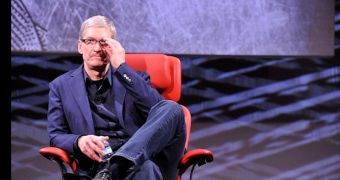In a controversial book about Apple post-Steve Jobs, author Yukari Iwatani Kane suggests that Tim Cook is far more concerned about operations than rolling out new products, in what undoubtedly sparks an immediate comparison with the late Steve Jobs, who was known as a man of action.
Tim Cook is a patient guy, but even he has a limit
Cook doesn’t care much about “Haunted Empire: Apple After Steve Jobs,” the book written by Wall Street Journal reporter Yukari Iwatani Kane with an apparently biased take on the company’s long-term potential after the loss of its visionary genius.
The CEO expressly sent a piece of his mind to CNBC this week calling the book, and others like it, utter “nonsense.” While the truth undoubtedly lies somewhere in the middle, author Iwatani Kane also has kind words for Cook in an interview with The New York Times.
Comparing the current Apple CEO to the former mercurial boss, Steve Jobs, Kane says, “Jobs routinely made a habit of calling people back midvacation.” Jobs would force employees to “work on Christmas Day because he decided he wanted a different color iPod shuffle at the last minute.”
However, Cook’s laid-back nature may not be the best thing for a company that was once notorious for bucking every trend, Kane outlines.
“While it’s nice for employees to get more flexibility with vacations and such, you lose the intensity that is required to keep hitting home run after home run. It’s not a surprise that one of Jobs’s first acts upon returning to Apple back in the 1990s was to eliminate its sabbatical program,” she tells the paper.
Steve Jobs still haunts Apple
Many people argue that Tim Cook cannot replace Steve Jobs, but there’s an equal amount of opinions that favor the current leadership. Here are just a few things Cook has done since Jobs passed away that can be deemed remarkable, to say the least.
First off, despite all the pressure to carry the torch, Tim Cook has never tried to be Steve Jobs. An operational whiz at heart, a year after Jobs’ death he rearranged the executive ranks to make Apple run smoother internally.
He paid the Chinese iPhone factories a visit to ensure that people there work in good conditions, something Jobs never bothered to do, despite widespread reports of Foxconn workers committing suicide because of the sweatshop conditions at the iPhone assembly lines.
He openly apologizes for the company’s mistakes and goes to great lengths to show a willingness to repair them. And he does repair them (Siri, Maps, etc.). In the process of fixing Maps, he fired Scott Forstall, one of Steve Jobs' protegees.
He doesn’t compromise on the employees’ morale for the sake of a color or a shape.
Instead of putting two people who don’t have the same mindset in the same office, he creates all-new divisions and new leadership roles to allow staffers to come to work every day with an open heart. One such example is Craig Federighi’s newly-formed engineering team. Another is Jony Ive’s extended role across Human Interfaces.
He also retains many of the qualities infused by Steve Jobs in Apple, such as the company’s veil of secrecy, the razor-sharp focus on perfecting a device before launch, and saying “no” to products, acquisitions, and shareholder proposals that aren’t on par with Apple’s DNA.
2014 and beyond
So while a comparison between Cook and Jobs will almost always haunt Apple, as Kane herself seems to suggest, it’s not a question of if Cook can run the show, but rather how.
Let’s not forget that Cook has yet to make his first all-new product launch. Things will start to take better shape once that happens. Not to say I want to see Mrs. Kane to bite her tongue, but two years of Apple’s existence in between major product launches isn’t a subject worthy of the headline “Haunted Empire.”

 14 DAY TRIAL //
14 DAY TRIAL //